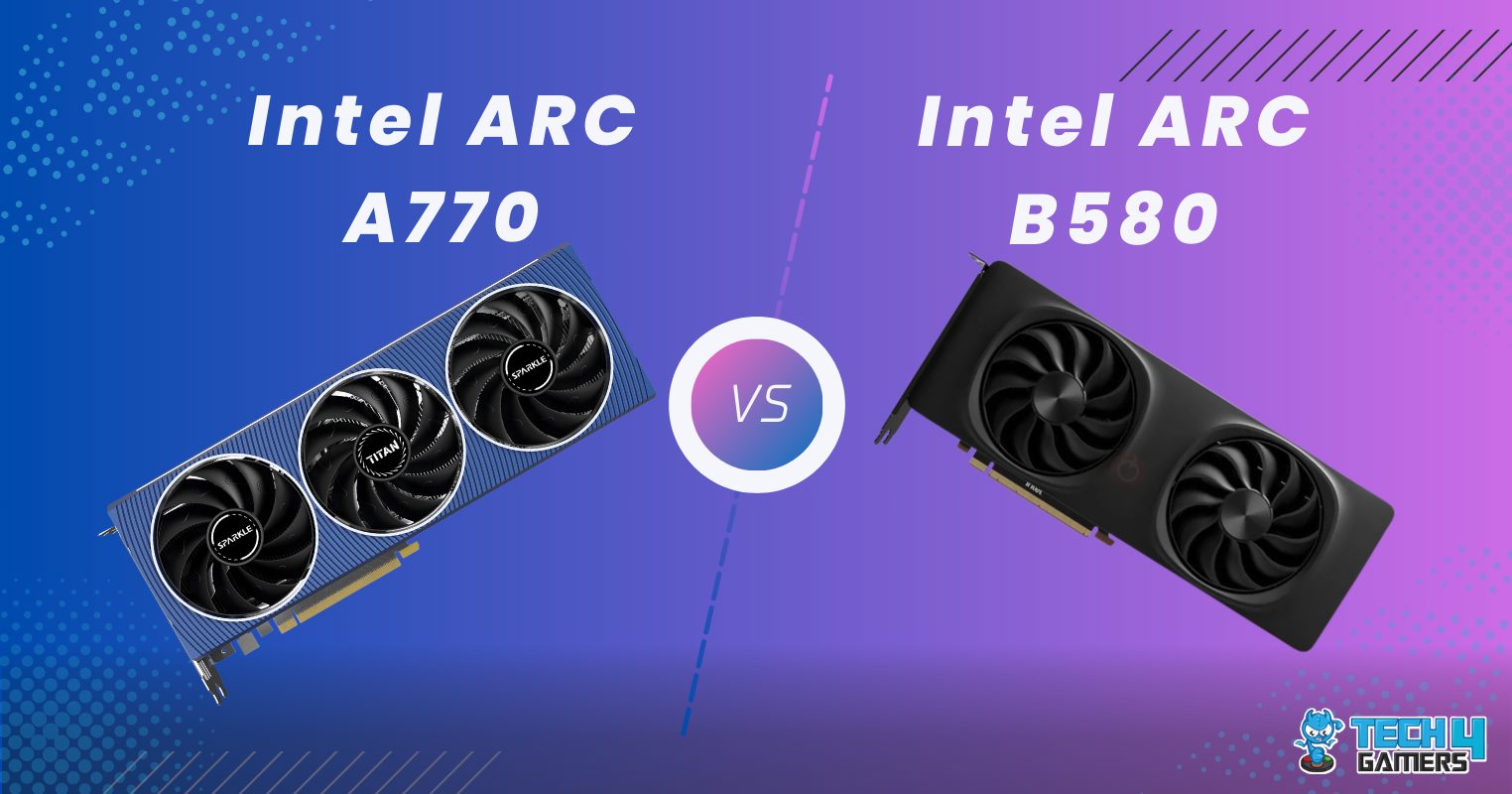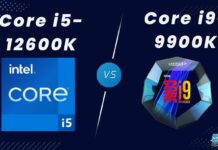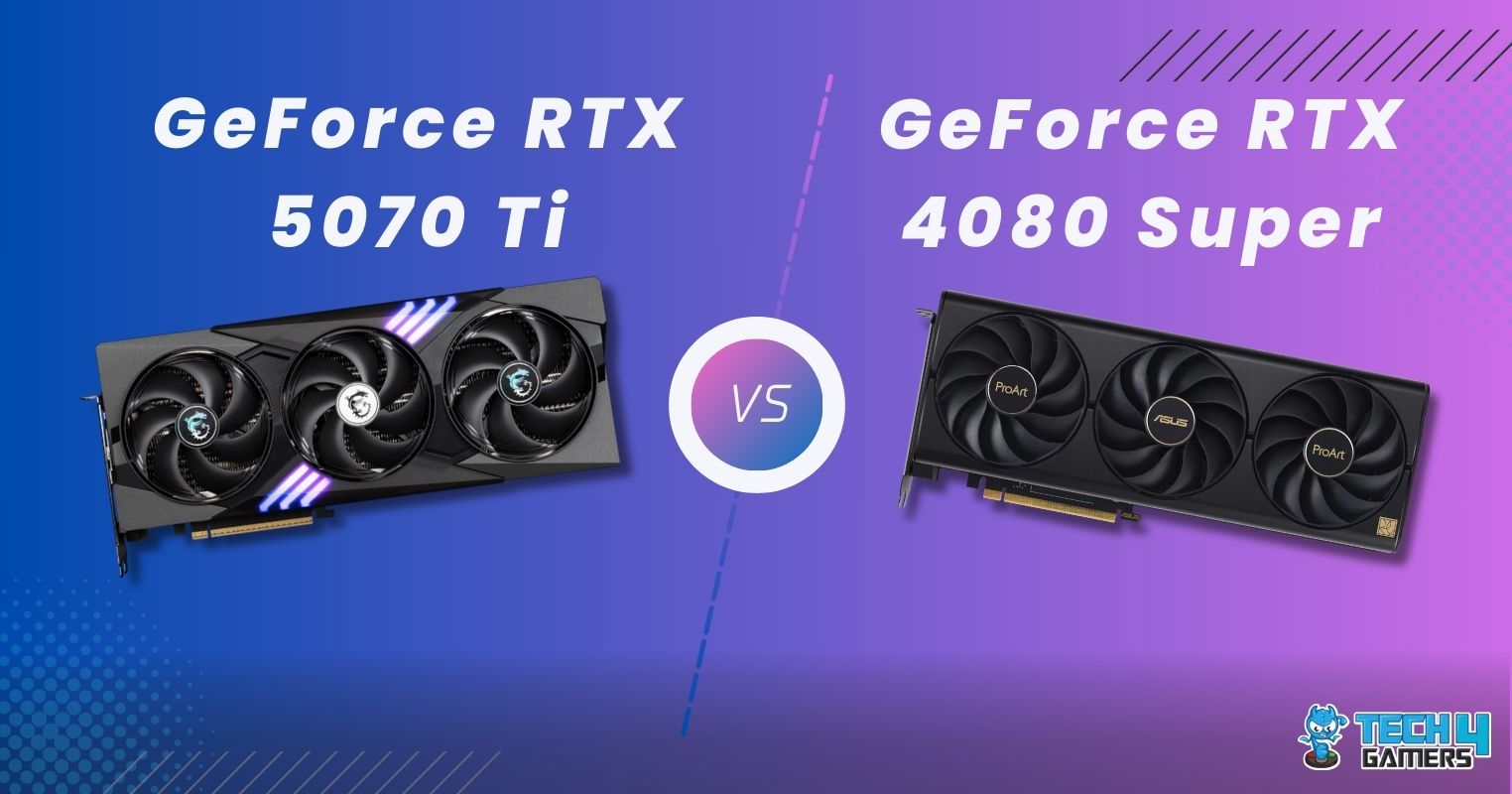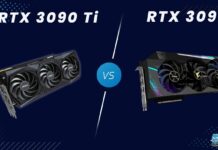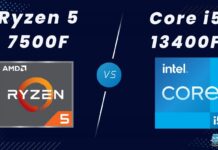Intel’s cutting-edge 14th-generation desktop processors have just hit the market. Today, we’ll analyze the real-world performance and efficiency gap between the 14th generation’s top CPU and the 13th generation’s mid-tier option. So, let’s start the Core i9-14900K vs i7-13700K comparison.
Key Takeaways
- Testing the Core i7-13700K, our editor Nauman has given it a solid rating of 9/10 due to its utilization of hybrid Raptor Lake architecture. However, the i9-14900K generation has slightly updated the architecture and named it Raptor Lake S Refresh.
- According to my benchmarks, the Core i9-14900K renders 5.33% better performance than the i7-13700K at 1080p resolution.
- During my tests, the Core i7-13700K had 4.5% better power efficiency and 3.3% more enhanced thermal efficiency than the i9-14900K.
Comparison Table
| Feature | Intel Core i9-14900K | Intel Core i7-13700K |
|---|---|---|
| Architecture | Hybrid Raptor Lake S Refresh | Hybrid Raptor Lake S |
| No. of Cores | P-Cores: 8 E-Cores: 16 Total Cores: 24 | P-Cores: 8 E-Cores: 8 Total Cores: 16 |
| No. of Threads | 32 | 24 |
| P-Core Base Frequency | 3.2 GHz | 3.4 GHz |
| E-Core Base Frequency | 2.4 GHz | 2.5 GHz |
| Max Turbo Frequency | Up to 6.0 GHz | Up to 5.4 GHz |
| Integrated Graphics | Intel UHD Graphics 770 | Intel UHD Graphics 770 |
| Graphics Frequency | Up to 1.65 GHz | Up to 1.60 GHz |
| Memory Type & Speed | DDR5: Up to 5600 MT/s DDR4: Up to 3200 MT/s | DDR5: Up to 5200 MT/s DDR4: Up to 3200 MT/s |
| Intel Smart Cache | 36MB | 30MB |
| Max. Operating Temperature | 100°C | 100°C |
| TDP | 125W - 253W | 125W - 253W |
| Launch MSRP | $589-$599 | $409-$419 |
| Best Motherboards | Best Motherboards For i9-14900K | Best Motherboards For i7-13700K |
| Best CPU Coolers | Best CPU Coolers For i9-14900K | Best CPU Coolers For i7-13700k |
| Best RAM | Best RAM For Core i9-14900K | BEST RAM For Core i7-13700K |
| Best GPU | BEST GPU For Core i9-14900K | Best GPU For Core i7-13700K |
Architectural Differences
- Process Node: The i9-14900K and i7-13700K share a common manufacturing process, both crafted at an advanced 10nm Intel node, showing their analogous fabrication technology.
- CPU Socket: Coming to the CPU socket, both the processors utilize the identical FCLGA1700 socket, comprising 1700 pins, to interface with the motherboard’s CPU socket.
- CPU Memory: The i9-14900K and i7-13700K have a max memory size of 128GB and support both DDR4 and DDR5. They have two memory channels and a max memory bandwidth of 89.6 GB/s.
- Clock Speed: The i7-13700K boasts a 6.25% higher base clock of performance cores, while the i9-14900K has an 11.1% greater maximum turbo clock. Additionally, both the CPUs feature Intel Turbo Boost Max Technology 3.0 Frequency.
- Integrated Graphics: Both processors feature dual-core Intel UHD Graphics 770 as their iGPU solution, thus ensuring concurrent graphics prowess. Nevertheless, the iGPU of the i9-14900K has a 3.12% higher graphics frequency.
Gaming Benchmarks
Let’s put both processors through rigorous gaming benchmark tests to understand their performance better. I inspected the gaming performance of the Core i9-14900K vs i7-13700K for 12 challenging games at 1080p. The gaming setup I employed had the following specifications.
Test Bench
- OS: Windows 11
- GPU: Asus Rog RTX 4090 OC Edition
- Motherboard: MSI MAG Z790 Tomahawk DDR5
- RAM: XPG Lancer RGB 32GB 7200MT/s DDR5
- SSD: XPG GAMMIX S70 BLADE 2TB NVMe
- PSU: ENERMAX REVOLUTION D.F. X 1050W
- Cooler: ARCTIC Liquid Freezer II 360 – Multi-Compatible AIO Water Cooler
A Plague Tale: Requiem

- Let’s begin with analyzing the gameplay of A Plague Tale: Requiem. The i9-14900K demonstrated an average frame rate of 150 FPS, 2.0% higher than the i7-13700K’s average of 147 FPS.
- Examining the worst 1% performance, I observed that the i7-13700K achieved 134 FPS, marginally lagging behind the i9-14900K’s 136 FPS.
Assassin’s Creed Mirage

- In my next gameplay, Assassin’s Creed Mirage, the i9-14900K scored a respectable average of 197 FPS, surpassing the i7-13700K’s 189 FPS by 4.2%.
- Considering the low 1% frame rates, I noted that the i9-14900K (164 FPS) established a greater lead of 16 FPS in this game, beating the i7-13700K’s 148 FPS.
Assetto Corsa Competizione

- During my test of Assetto Corsa Competizione, the i9-14900K outperformed the i7-13700K by 6.2%, achieving a brilliant 172 FPS compared to later’s 162 FPS.
- Regarding low 1% performance, the i7-13700K managed 135 FPS, whereas the i9-14900K mustered a higher frame rate of 149 FPS.
Baldur’s Gate 3

- In my evaluation of Baldur’s Gate 3, the i9-14900K topped the i7-13700K by 4.5%, attaining an impressive 155 FPS compared to the latter’s 148 FPS.
- The i7-13700K yielded 127 FPS at low 1% performance, while the i9-14900K demonstrated a higher frame rate of 132 FPS.
Cyberpunk 2077

- During my assessment of Cyberpunk 2077, the i9-14900K defeated the i7-13700K’s 163 FPS by 3.7%, achieving a superb 169 FPS.
- Per my testing, the i9-14900K delivered a higher frame rate of 142 FPS, while the i7-13700K provided 137 FPS at the low 1% performance.
Hitman 3

- While playing Hitman 3, I got 282 FPS with the i9-14900K, an 8.05% better average performance than the i7-13700K’s 261 FPS.
- Additionally, the i9-14900K exhibited superior low 1% performance with a frame rate of 253 FPS, outshining the i7-13700K’s 238 FPS.
Hogwarts Legacy

- According to my test of Hogwarts Legacy’s gameplay, the i7-13700K was only 2 FPS or 2.7% behind the i9-14900K’s average frame rate of 76 FPS.
- In the low 1% performance domain, the i9-14900K excelled further with a notable 50 FPS, eclipsing the i7-13700K’s performance at 45 FPS.
Spider-Man Remastered

- Assessing my Spider-Man Remastered gameplay, the i7-13700K lagged behind the i9-14900K’s 156 FPS by 11 FPS, or 7.6%, with an average frame rate of 145 FPS.
- Regarding low 1% framerates, the i9-14900K exhibited superior prowess with an impressive 128 FPS, outshining the i7-13700K’s performance at 123 FPS.
Star Wars Jedi: Survivor

- During my assessment of Star Wars Jedi: Survivor, the i9-14900K outpaced the rival by 6.3%, achieving a beautiful 168 FPS on average compared to 158 FPS for the i7-13700K.
- Furthermore, per low 1% framerates, the i9-14900K showcased its supremacy again, boasting an impressive 152 FPS against the i7-13700K’s performance at 144 FPS.
Starfield

- In scrutinizing my experience with Starfield, the i7-13700K fell short of the i9-14900K’s 108 FPS by 11 FPS or 11.3%, maintaining an average frame rate of 97 FPS.
- At the low 1% performance, the i9-14900K proved its superiority, achieving a remarkable 91 FPS contrasted to the i7-13700K’s 84 FPS.
The Last of Us Part I

- While playing The Last of Us Part I, the i9-14900K overtook the i7-13700K’s 177 FPS by 2.8% with an impressive average score of 182 FPS.
- About the low 1% performance of two CPUs in this game, I observed that the i7-13700K could only manage 158 FPS, while the i9-14900K turned 169 FPS.
Watch Dogs: Legion

- Considering my Watch Dogs: Legion gameplay results, I found that the i9-14900K heads the i7-13700K’s 161 FPS by 4.3%, attaining an average of 168 FPS.
- In my test, the i9-14900K delivered a prominent low 1% performance with a frame rate of 124 FPS, while the i7-13700K produced only 117 FPS.
For a well-rounded choice that delivers strong gaming and work performance without straining your budget, my top recommendation is the i7-13700K. It’s cost-effective, providing excellent value with a 51.8% lower price tag compared to the Core i9-14900K, making it an easier selection for balanced performance on a budget. You can read more about it in another review of ours where we put the i7-14700K to test against the i7-13700K.
– Abde Manaf
Overall Gaming Performance

Average Frame Rate
When I analyzed my overall benchmark metrics of the Core i9-14900K vs i7-13700K, the i9-14900K came out the top in gaming mastery. It produced a striking average of 158.0 FPS at 1080p, surpassing the i7-13700K’s 150.0 FPS average enactment.
I played 12 challenging games at 1080p, and the i7-13700K could not beat the i9-14900K’s performance in any game. Hence, the i9-14900K demonstrates a 5.33% gaming performance edge over the i7-13700K at 1080p.
Here is a glimpse of the gameplay that we captured while conducting these benchmarks:
Low 1% Frame Rate
Analyzing the metrics of low 1% performance, the i9-14900K demonstrates a mean of 132.0 FPS, surpassing the i7-13700K’s 124.0 FPS. So, at the low 1% gaming performance, the i9-14900K prevails over the i7-13700K by a margin of 6.4%.
Winner: Intel's Core-i9 14900K
Gaming Power Consumption
| Game | Intel Core i9-14900K (W) | Intel Core i7-13700K (W) |
|---|---|---|
| A Plague Tale: Requiem | 81 | 78 |
| Assassin's Creed Mirage | 134 | 125 |
| Assetto Corsa Competizione | 120 | 122 |
| Baldur's Gate 3 | 96 | 87 |
| Cyberpunk 2077 | 134 | 129 |
| Hitman 3 | 123 | 109 |
| Hogwarts Legacy | 80 | 73 |
| Spider-Man Remastered | 145 | 146 |
| Star Wars Jedi: Survivor | 117 | 104 |
| Starfield | 142 | 143 |
| The Last of Us Part I | 140 | 139 |
| Watch Dogs: Legion | 137 | 131 |
| Average Power Draw | 120.75 | 115.5 |
| Winner: Intel's Core-i7 13700K | ||
During my gaming spell, the i9-14900K dissipated an average power of 120.75 watts. On the other hand, the i7-13700K had a comparatively lower power draw of 115.5 watts.
About the performance-to-power ratio, the i7-13700K yielded 1.31 frames per watt, while the i9-14900K registered 1.30 frames per watt. Accordingly, the i7-13700K leads the i9-14900K by an average of 4.5% in terms of power efficiency, leading to savings in electricity costs.
To learn more about energy consumption in gaming, read Gaming PC Power Usage.
Gaming Temperatures
| Game | Intel Core i9-14900K (°C) | Intel Core i7-13700K (°C) |
|---|---|---|
| A Plague Tale: Requiem | 65 | 64 |
| Assassin's Creed Mirage | 63 | 67 |
| Assetto Corsa Competizione | 68 | 62 |
| Baldur's Gate 3 | 70 | 65 |
| Cyberpunk 2077 | 66 | 64 |
| Hitman 3 | 69 | 68 |
| Hogwarts Legacy | 68 | 65 |
| Spider-Man Remastered | 72 | 71 |
| Star Wars Jedi: Survivor | 69 | 66 |
| Starfield | 73 | 69 |
| The Last of Us Part I | 67 | 64 |
| Watch Dogs: Legion | 64 | 62 |
| Average Gaming Temperature | 67.8 | 65.6 |
| Winner: Intel's Core-i7 13700K | ||
During the course of my testing, the i9-14900K maintained an average gaming temperature of 67.8°C. In contrast, the i7-13700K exhibited a cooler thermal profile, registering an average temperature of 65.6°C.
The i7-13700K exhibited elevated temperatures relative to the i9-14900K in specific gaming scenarios. However, it concurrently maintained a lower average temperature across the tested games. My results indicate that the i7-13700K proves a thermal efficiency superiority of 3.3% over the i9-14900K.
To save your processor from overheating, check our guide on How To Lower CPU Temperature.
Price And Availability
Regarding the MSRP, Intel launched the i7-13700K at a price point of $419 and introduced the i9-14900K with a price tag of $599.
Nevertheless, the pricing dynamics of processors fluctuate with market demands and the introduction of newer models. The i7-13700K presently commands a retail price of $364 on Amazon, while the i9-14900K is available at a rate of $575.
Coming to performance per dollar, the i7-13700K offers 0.41 FPS per dollar, while you get 0.27 FPS for every $1 with the i9-14900K. Thus, the i7-13700K surpasses the i9-14900K by 51.8% in cost-effectiveness.
Finally, about availability, both of the processors are easily available in both online and offline markets. You can also order them from Intel’s official store.
Which One Should You Go For?
To conclude the comparison of the Core i9-14900K vs i7-13700K, let us decide which of these processors aligns more suitably with your preferences and computational requirements.
If you are looking for an optimal processor that balances excellent performance for gaming and routing work at a lower cost, I recommend the judicious selection of the i7-13700K. It is 51.8% more cost-effective than the i9-14900K, providing duly justified performance in budget.
Notwithstanding, for those inclined to invest without constraint in pursuit of paramount gaming prowess, I recommend the i9-14900K. It also performs incredibly well in terms of productivity and content generation.
Pros And Con
| Intel Core i9-14900K | Intel Core i7-13700K | ||
|---|---|---|---|
| Pros | Cons | Pros | Cons |
| Gaming and productivity performance | High Power Usage | Great multi-threaded performance | Limited overclocking |
| 6.0 GHz boost clock | Slight BIOS tuning is required | Justified price | High Power Consumption |
Frequently Asked Questions
The Core i9-14900K has an 11.1% higher maximum turbo clock than the Core i7-13700K, which features a 6.25% higher base clock of performance cores.
More From Core i7-13700K:
More From Core i9-14900K:
Thank you! Please share your positive feedback. 🔋
How could we improve this post? Please Help us. 😔
[Comparisons Expert]
Abdemanaf is a skilled creative writer who has been honing his craft since 2011. While initially working in different fields, he found a passion for technology and has been exploring the tech world since early 2015. Over the years, he has developed an in-depth knowledge of the latest tech trends and product offerings by various companies.
Abdemanaf’s writing reflects his analytical mindset and ability to think critically. He has a knack for breaking down complex technical information into easily digestible pieces, making his articles engaging and accessible to readers from all backgrounds. In February 2022, he joined Tech4Gamers as a blog and product comparison writer, where he has been able to hone his skills further.
As a writer, Abdemanaf is dedicated to staying up-to-date with the latest technological advancements and trends, enabling him to provide readers with the most relevant and accurate information. He is always eager to learn more and is constantly seeking new challenges to improve his skills.
Get In Touch: manaf@tech4gamers.com


 Threads
Threads